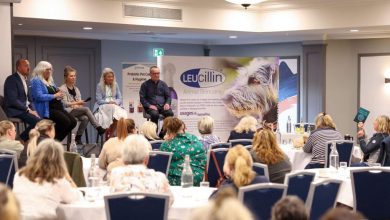Dr. Conor Brady of Dogs First talks critters, chemicals, and corporations.
Tell us about the benefits of Diatomaceous Earth for those Westie owners that want to go down the natural route.
Diatomaceous Earth (DE) is fantastic. It’s a very fine chalk-like powder, the result of millions of little sea creatures sinking to the bottom of the ocean over billions of years. As opposed to the chemicals used today, DE kills mechanically, lacerating shells, clogging air holes, choking and drying the bug out. It’s totally harmless and many folks actually eat it (not recommended although most types are Codex food grade). This means DE doesn’t have side effects (but if you have anyone with lung issues in the house you should talc them outside as DE might aggravate). It works fairly effectively on all bugs – fleas, ticks, mites, ants, spiders – you can even mix it with water and spray on your plants as a way of controlling green fly (careful outside, it will harm bees too). Finally, look at the price of it. A bag will last for years.
Why is the natural route so important in your view?
I’m not a fan of chemical parasite control for pets with no parasites. Studies show that side effects are far from rare, as is commonly touted. From itch to seizures to death, these chemicals can have very serious immunological side effects with some of the most popular today (a result of heavy advertising in veterinary circles) among the worst offenders. We are now getting signs near waterways asking pet owners to not let their dogs swim in the water. And yes, they can affect us too. Very potent, very nasty chemicals you drop on the back of their neck where they are designed to stay for a month, the same neck you and the kids rub and nuzzle into every day thereafter. Or, worse still, extremely toxic chemical powders on collars that makes its way into the air of your house, into the dust where your children crawl.
Guys, such chemicals don’t exist for humans for a reason. Our kids have a 1/10 chance of picking up nits in school. We don’t put a chemical on them in advance and just in case do we? Instead, we cross our fingers and hope our kids don’t get them.
Avoiding the chemical route is all the more important for Westies. They went through a number of tight genetic bottle necks. Along with the white coat, this has resulted in Westies being up near the top of “allergy” cases coming into us. Recurring skin (and gut) conditions are too common. Worse, when they go really wrong, they can be tricky to get right. By measuring levels of homocysteine in the blood (a stress metabolite), studies show dry food antagonises the immune system almost ten-fold compared to raw, so feeding fresh, species appropriate raw dog food is crucial for this breed. But in a close second is the avoidance of all the chemical products we are told our pets need – chemical flea control for pets with no fleas, chemical worm control for dogs with no worms, annual booster for already adequately vaccinated dogs, the completely useless KC vaccine, lepto. All of it should be questioned. The less “products” you use on Westies the better, that’s now certain.
How concerned should dog owners be if their besties have fleas?
I wouldn’t be concerned about fleas in the slightest. I’d rather the critter than the chemicals used to prevent them. But more than that, fleas are something of a bio-indicator. Healthy dogs don’t tend to get infested, only the very young, old, sick and dying (animals with weak immunity) seem to suffer. It’s like mange. Demodex is all around us all the time but it’s only the highly stressed dogs in kennels that get over-run with it. If you see fleas on your dog, I would be more concerned with what might be going on under the hood.
What is your opinion on brands such as Frontline and what is the long-term impact of these in your opinion?
I very strongly advise not using any such products unless absolutely vital. A dog overrun with sarcoptic mange, for example.
Some vets appear to suggest Frontline & Bravecto. Why don’t they suggest the natural route?
I think most vets believe what they are doing is right and in the best interests of your pet. They’re animal lovers, worked hard to get into that position and are hardly driving around in Porsches. However, we know vets are not taught about “natural” anything in college, be it flea control or the very obvious benefits of fresh, species appropriate food for pets. Corporate funded seminars and reps sell them the easy, effective, “safe” and profitable solution. Furthermore, we have all the evidence we need that the take-over of private vet practices by corporations whose sole focus is to increase revenue year on year has resulted in an explosion of “treatments”. Pet drugs are the new frontier for big Pharma and business is booming.
You have mentioned that fleas can be a symptom of other problems. Can you elaborate on this?
You have all sorts living in your gut, not just bacteria but viruses, protozoa, and numerous fungi. When your gut flora is out of whack, let’s say a high-sugar diet, the yeasts that live in your gut can bloom and you get thrush. It’s not that you “got thrush”, you always had it, it’s just the conditions are now ripe for it to bloom. This is the same with many bugs – a healthy, balanced, robust system keep them all in check. In this way, and to simplify, the immune system is like a forcefield. It keeps everything at bay, including the pathogenic stuff at your skin barrier. If you want to keep fleas at bay, you need the immune system (and gut flora, which are intertwined) firing on full cylinders. Stress, gut dysbiosis (out of whack gut flora), disease, chemical insult, age, a diet full of sugar, bad fat and nasty preservatives whilst void of life-affirming bioactive compounds, all annihilate your immune system. You lower the defence, and anything can get in.
How easy/difficult is it to get rid of fleas once your Westie has them? What are your tips?
It’s simple, unless your dog is desperately sick. Aside from DE if they have an infection. You must do it twice, once and then 4-7 days after to catch any of the eggs you missed. You should also either hot wash their beds or bag them up and leave for a week or two. Fleas need food and will die off if they don’t get it. Vacuum up their surroundings paying particular attention under radiators etc. Use flea traps to check if you have them all. Other cool natural products for fleas include cedarcide or neem oil (bugs don’t like an environment that smells of neem or citronella, hence they’re in mosquito candles which work great. Popular products like Billy No Mates work well as a preventative too (and ticks, much trickier little critters as they are more opportunistic, latching on to whoever walks by).
If you need to go nuclear for whatever reason, make sure to give some antioxidants and immune boosters after (echinacea for immune boost, seaweed or golden turmeric paste for anti-inflammatory, green leaves like raspberry or dandelion for the kidneys, milk thistle to support the liver).






